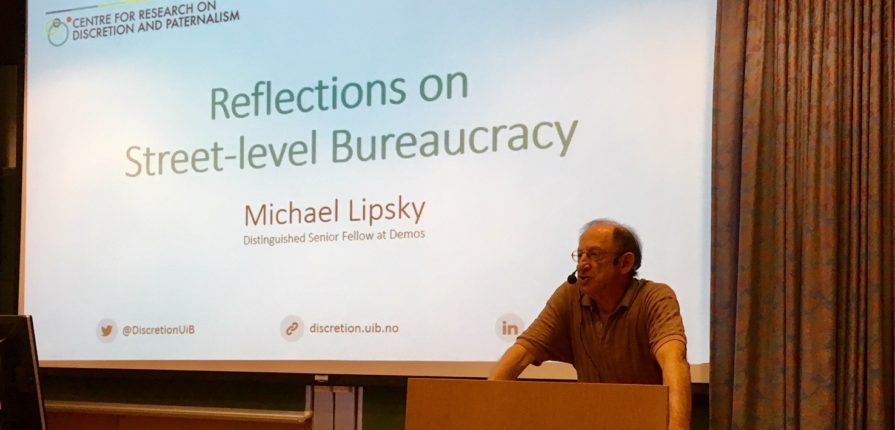GUEST LECTURE: Michael Lipsky is concerned about the support given to social workers and other street-level bureaucrats.
Michael Lipsky’s theory of street-level bureaucracy is used worldwide, and his work has had enormous influence. The immens interest for his guest lecture at Centre for Research on Discretion and Paternalism resulted in a large turnout, leaving almost no seats free in the auditorium.
Professor Marit Skivenes introduced Michael Lipsky as one of the most influential researchers in the field of public administration:
– Political journalists and scientists often tend to ignore the political power held by public service workers that are making decisions on a case-to-case basis. Lipsky reminds us that the difference between policy in theory and policy in practice can be substantial and troubling, due to the discretion wielded by the public service workers.
Hold political power
In the book “Street-Level Bureaucracy: Dilemmas of the Individual in Public Services”, Lipsky posits that state employees (such as the police, social workers and legal-aid lawyers) should be seen as part of the policy-making community and as exercisers of political power. In the lecture, Lipsky elaborated on the topic.
– Street-level bureaucrats are public workers that interact with citizens in the course of their jobs. They exercise discretion, provide access to information about public laws and programs, and interact with citizens in their executions of these laws and programs.
Difficult job
A core argument of Lipsky is that the front-line services are typically under-financed. The street-level bureaucrats labor under huge caseloads, ambiguous agency goals and inadequate resources.
One of Lipsky’s messages in the lecture was that street-level bureaucrats have an important, but also very difficult job. He was concerned with the organizational conditions for making good decisions in the front line services.
– There must be reflective practice and support for individuals who may make mistakes. If you are not allowed to make mistakes, you will always take the easy way out, and not make difficult decisions.
Important research question
Professor Marit Skivenes concurred with the need to improve decisions made by public service workers.
– One of the most important research questions we have in contemporary political science is how to understand professional discretion.
– It is critical to have more knowledge on how to best organize and regulate to ensure equal treatment and conformation to policy goals, without removing the opportunity for front line personnel to apply professional knowledge and make necessary individual adjustments.


